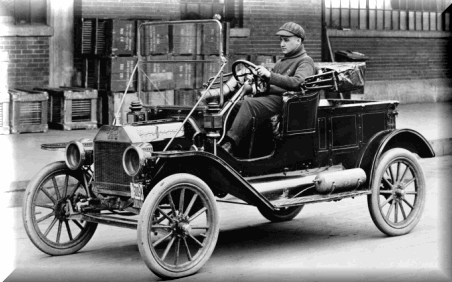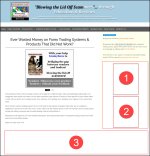- Home
- Forex Articles
- Trading Psychology
Trading Psychology; The Greatest Weakness Is The Human Element
In his book "45 Years In Wall Street" (1942), W.D. Gann page 25 states in relation to trading psychology the greatest weakness is the human element.
He writes that when a trader makes a profit, he gives himself credit
and feels that his judgment is good and that he did it all himself. When
he makes losses, he takes a different attitude and seldom ever blames
himself or tries to find the cause with himself for the losses. He finds
excuses; reasons with himself that the unexpected happened, and that if
he had not listened to some one else's advise, he would have made a
profit. He finds a lot of if's and but's, which he imagines were
no fault of his. This is why he makes mistakes and losses the second
time.
The investor and trader must work out his own salvation
and blame himself and no one else for his losses, for unless he does he
will never be able to correct his weaknesses. After all, it is your own
acts that cause your losses, because you did the buying and the selling.
You must look for the trouble within and correct it. Then you will make
a success, and not before.
One of the main reasons why
traders make losses is because they do not think for themselves and
allow others to think for them and advise them, whose advice and
judgment is no better than their own. To make a success, you must study
and investigate for yourself. Unless you change from a "lamb" to a
thinker and seek knowledge, you will go the way of all lambs, - to
slaughter underthe margin caller's axe. Others can only help you when
you help yourself, or show you how to help yourself.
Mr Gann
goes on to say that a person can get the best rules and methods (or
strategies) in the world for trading, and then lose money on account of
the human element (Trading Psychology) which he considers the greatest
weakness. He says you will fail to follow rules. You will work on hope
or fear instead of facts. You will delay. You will become impatient. You
will act too quickly or you will delay too long in acting, thus
cheating yourself on account of your human weakness and then blaming it
on the market. Always remember that it is your mistake that causes
losses and not the action of the market or the manipulators. Therefore,
strive to follow rules, or keep out of the speculation for you are
doomed to failure.
Straight forward words from Legendary
Trader William Gann about how trading psychology can greatly impact a
trader without his or her even knowing it.
____________________________________________________________
Another quote from another of his books 'New Stock Trend Detector' WD Gann 1936. page 93
The Following of Rules Makes Profits
"The
human element beats most traders. The market does not beat them.
Eliminate human judgment and guesswork. Do not buy or sell on hope or
fear.
The man who will make up his mind to follow rules
strictly to the letter will make profits. Prove to yourself that the
rules work which I give you and then follow them. Buy and sell when the
rules indicate that it is time to buy or sell and then do not close
trades and take profits until the rules indicate that it is time for a
change in trend; then make your trades accordingly and you will make a
success". WD Gann.
___________________________________________________________
Larry Williams Thoughts on Trading Psychology
Larry
Williams on page 171 of his book "Day Trade Futures Online mentions
psychology of trading in the most simplest of terms. After explaining
his rules for exiting a position, says..... "That is all I have to tell
you about exits. Don't GET GREEDY, let THE RULES, not your emotions,
take care of your trades". L Williams.
____________________________________________________________
Successful
traders have learn't how to control their natural emotional weaknesses
relating to following their system or trading method. It is a natural
tendency to close a trade for a profit just because it is available for
the taking. Thoughts come up into your head saying "quick take this
profit before it disappears" ..... then after taking the profit you
watch on the sidelines as your profit doubles had you followed your
rules and left the trade to mature. These emotional states also apply to
controlling losses. Successful traders are good at taking small losses
when their system tells them to do so. The novice will not be able to
take losses because he feels that it will hurt him. So he holds on in
hope that the market will turn around. The taking of small losses are
part of the business of trading. Sometimes a series of unexpected
consecutive losses occur that will have the novices emotions running
wild. The experienced trader has already learn't how to come to grips
with this real possibility. He still keeps trading the same system that
he has tried and tested and has faith in. He knows his position sizing
strategy will be able to handle these series of losses when they occur
from time to time. He is not fearful or discouraged. He knows he will
also meet up with a series of consecutive profits as well that will more
than make up for any losses he takes.
To trade any system
successfully the individual trader must do his part in making sure that
the other components of achieving success like trading psychology are
not undermined. If for example only 'one' element is missing or lacking
it will mean our trader will fail. It could be a good system but the
trader fails to follow the system rules. He takes profits too soon. He
does not follow his predetermined stop loss strategy.
Read more about what Neuroscientists have discovered in recent years on how to improve mental fitness / trading psychology here.
The three trading essentials of System, Money Management and Trading Psychology can be likened to the components of a car
Engine = System / Strategy. Read more about systems here.
Wheels = Money Management / Position Sizing. Read more about money management here.
Chassis = Trading Psychology / Emotions
The question is what component is the most important? System? Money Management? or Trading Psychology?
If we have a problem with any one
component of our car, either the engine, wheels or chassis, we will not
get anywhere too fast. Same for traders, lack in any one area and the
trader will have problems with their account balance.
It is
interesting to note that many successful traders say that trading
psychology is the greatest element relating to their success.
Consider the following different scenarios;
Imagine having a great system, great mental discipline but poor money management = failure
or
Imagine having a great system, great money management but no discipline to trade the system as designed = failure
or
Imagine having great mental discipline, great money management but a poor trading system = slow progress.
We can see that the majority (if not all) whom desire to become and stay successful traders have lots of work and study and practice to master all these 'Essentials'. Intelligence is not the factor that will provide success, rather it is bold perseverance to keep on trying and improving in all these areas.

What will prevent a car from arriving at its destination? Engine problems? Wheel problems? or Chassis problems?
Yes, it's any one of these things.
Your thoughts on trading psychology?
Are you struggling to deal with your emotions when trading? Have you found a cure or something that helps? What works for you? Share it!
Or Maybe you would like to share a disaster story? The time your emotions got the better of you in one of your more memorable BAD trades?
What Other Visitors Have Said
Click below to see contributions from other visitors to this page...
good performance boils down to discipline Not rated yet
We believe the results of good performance boils down to the disciplined trading approach adopted by traders. In trading money should be subjected to the …
Quick and accurate Not rated yet
Totally agree. In a perfect account, trades would be:
IN >> MAKE A PROFIT >> OUT
...just like that! No open trades waiting for the market to move …





